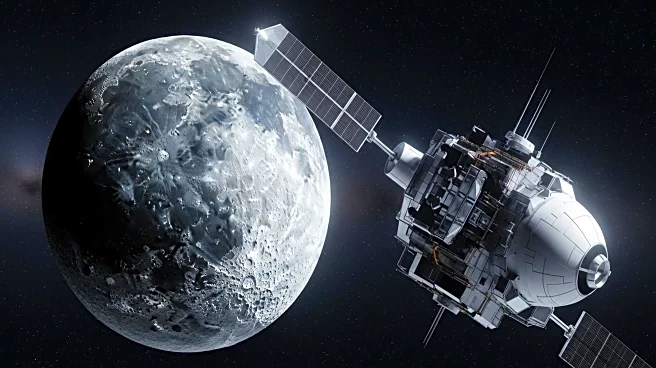What's Happening?
NASA and researchers are evaluating strategies to prevent asteroid 2024 YR4 from potentially colliding with the Moon in December 2032. Initially thought to have a 3% chance of hitting Earth, refined models now indicate a 4% chance of impacting the Moon. The asteroid, approximately 60 meters in diameter, poses a threat due to the potential debris field it could create, which might increase micrometeoroid activity affecting Earth-orbiting satellites and astronauts. Two primary options are under consideration: deflection, which involves altering the asteroid's trajectory, and destruction, which could involve kinetic impact or nuclear disruption. Accurate mass estimation is crucial for deflection, but current estimates vary widely, complicating mission planning.
Why It's Important?
The potential impact of asteroid 2024 YR4 on the Moon could have significant implications for space operations. A collision would generate a debris field, increasing the risk to satellites and space stations, including the International Space Station. This scenario underscores the importance of developing effective asteroid mitigation strategies to protect space assets and human activities in orbit. The decision between deflection and destruction involves technical and political considerations, particularly regarding the use of nuclear options in space. Successful mitigation would demonstrate advanced capabilities in planetary defense, potentially influencing future policies and international cooperation in space exploration.
What's Next?
NASA and its partners must decide on a course of action by 2028, when more accurate data on the asteroid's trajectory will be available. If deflection is chosen, reconnaissance missions may be needed to refine mass estimates. Alternatively, existing missions like OSIRIS-APEX or Psyche could be repurposed to assist. The destruction option, particularly using nuclear methods, requires careful consideration of political and technical factors. As the launch window for potential missions narrows, timely decisions are critical to ensure readiness for any necessary interventions.
Beyond the Headlines
The ethical and legal implications of using nuclear devices in space are significant, potentially setting precedents for future planetary defense strategies. The decision-making process will likely involve international collaboration, highlighting the need for global consensus on space security measures. Additionally, the event could catalyze advancements in asteroid detection and mitigation technologies, influencing long-term space exploration and defense policies.









